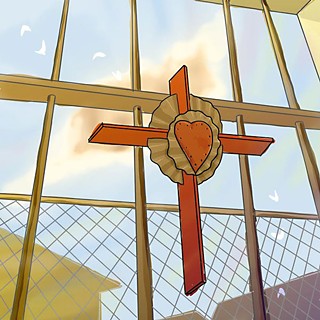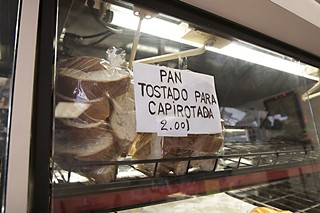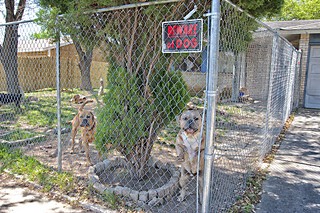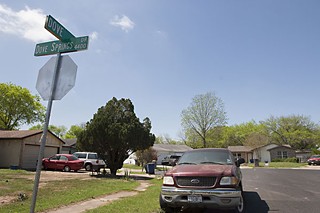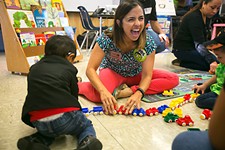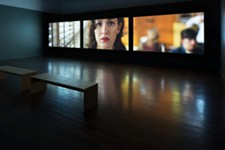On Leaving Dove Springs
A meditation on neighborhood, fear, family, and change
By Sam Anderson-Ramos, Fri., Aug. 22, 2014
On my last visit to my parents' house in Dove Springs, my mother showed me the hiding spot: the place where I could leave my laptop so that if someone broke into the house looking for valuables, it wouldn't be found. After carefully securing the laptop and making sure a light was on to give the appearance that someone was home, we were comfortable that we could go about our business in the city.
I would like to describe the hiding spot, if only to give a better understanding of the care with which this ritual is undertaken in the Ramos household. After some consideration, I've decided not to. My parents still live in that house, and if, by some circumstance, my description were to reach the wrong people, those people might decide to pay a visit to the house, and the hiding place would no longer be effective.
It wouldn't be the first time "those people" have been to the house. The first time our house was broken into was in 1990, when I was about 8 years old. The most recent occasion was circa 2009, a nearly 20-year span. By then my parents were living alone and had long since instituted a lockdown policy, including building a fence around the front yard and stowing any valuables that couldn't be carried whenever they were away from home.
In 1990 I was the first one home; I found my sister's window removed, our belongings strewn over the living room. In 2009, it was my mother who came home first. Pulling up and seeing the garage door open, she called the police from the car. When an officer showed up he told her to stay in the car, that he'd have to wait for backup before going inside. When backup arrived, the police converged on the house with their guns drawn. The family dog, Buster, a small terrier similar to the dog on Frasier, came running out and into the car with my mother, where he huddled against her until the police had cleared the house.
The few valuables that could be stolen were stolen. Again, I don't feel comfortable saying much more here, because my parents are still in the neighborhood, and I don't want to accidentally provide information that might cause them trouble. Our fingers are crossed that it won't happen again, but the truth is it could happen any time – thus the hiding spots. Thus my parents' interest in putting in a new, more foreboding fence. Thus my parents' wish to keep the intense overgrowth of trees, poison ivy, and thorn bushes that have overtaken the fence behind the house, because it protects the back of the house from trespassers.
Thieves Imagined
Between these two burglaries have been many similar incidents, including at least one other burglary. (I could easily find out how many times the house has been broken into by asking my parents, but it seems telling that I don't exactly remember. My best guess is four). My sister watched from her bedroom window as a stranger drove our mother's car away. My father came home once to find my mother's car up on blocks, the tires stolen. Someone once drilled a hole in the window of my father's truck, presumably a clumsy attempt to access the door lock. One night while I was on the phone, I heard something being smashed in the front of the house. I joked to my friend that someone was probably breaking into my car. The next morning I found that my driver's side window had been busted out. My first puppy, ironically named Lucky, was stolen from our front yard during her morning bathroom break. I have a feeling that one's first puppy being stolen in broad daylight and in full view of neighbors is one of those experiences known as "traumatic," the full effects of which I probably still don't fully understand.
Of all the incidents mentioned above ("incidents" is too euphemistic; they are crimes), the theft of Lucky is perhaps the most telling, if only because it is so over-the-top, so ridiculously sinister. One might like to believe that criminals live by a code of honor, one that would preclude stealing puppies from children. But we are not talking about an organized collection of criminal masterminds with a sophisticated, Robin Hood perspective in a troubled capitalist class system. What we're talking about in Dove Springs is a confused neighborhood with the cohesion and stability of an amoeba, a splintered system of individual interests, most of which are formed by a self-generated dedication to what is right. These are the good people, the ones, like most people, who only want to be and have good neighbors, who want to work and raise their families and feel safe, regardless of race (Dove Springs is mostly Hispanic).
Then there are the others: the ones with interests that conflict with their neighbors. This summer, visiting my parents, my mother informed me that her most recent loss – a sacrifice to the malevolent gods of Dove Springs (there are benevolent gods, too) – was a clay cross she'd hung on the front of the house. Someone had seen it, walked across the yard, and taken it. She'd found the cross at a garage sale and when she looked it up later, after it was stolen, she learned it was selling online for more than a hundred dollars. Thus the twists and whirls of commodity exchange in Dove Springs.
My mother said the cross had been stolen near Mother's Day and we determined that some teenager had most likely seen the cross and decided it would make a good Mother's Day gift. First I was angry that someone would steal from my family. Then I speculated that the thief might have been in dire straits, a troubled kid who wanted to do something nice for his mother and thought the answer was giving her something he couldn't buy but could easily steal. The circumstances of this imagined kid's life, having somehow influenced him to deaden his instincts for kindness, might be truly terrifying, calling to mind various degrees of child abuse and deprivation. By empathizing with the hypothetical thief I can find some peace with whoever the person was who chose to victimize my mother.
It's the same way that I like to imagine the man who stole Lucky (witnesses described a man) as wanting to give something special to his son, a boy like me who could never afford his own puppy (though we got Lucky for free, out of a box in the parking lot of the H-E-B at the corner of William Cannon and I-35). I like to think that boy took good care of Lucky, taking her to the vet, having her infected eye examined and cared for, feeding her daily and giving her clean water, so that Lucky might be alive somewhere in Dove Springs even today, under a different name. I have to imagine it this way, because the alternative is to think of her lingering, angry and hungry, in a garbage-strewn yard, chained to a tree, flea-infested, her infected eye so neglected that she's lost her sight. Or that she found her way to a dog-fighting ring in someone's backyard, run by the very people who used to scare me when I walked home from Mendez Middle School, hooting and laughing as she is mangled by a bigger, meaner dog.
Of course, I will never know what happened to Lucky, and I will never know the story of the kid who stole the cross from my mother. The thieves were never caught. None of them have been caught. The only thing we can do is imagine. One of my favorite scenes from The Office is when Michael Scott tries to turn stereotypes on their head by describing a convict who wears a backwards cap and says things like, "that's shizzle." "Who are you picturing?" he says. "A black man? Wrong. That was a white woman. Surprised? Well, shame on you." The joke is that he believes he can hide his own prejudices by over-simplifying them and then blindly denying them. In this same way, I might imagine that the people who broke into our house were white, middle-aged soccer moms, or maybe Fortune 500 CEOs. If I were to give in to my fear of appearing prejudiced, the way Michael Scott does, I would have to either come up with a wildly unlikely scenario, or perhaps more wisely, avoid imagining the thieves at all. But in the face of actual events, this is impossible.
If you have been robbed, you know the sense of violation that comes with it, that something was done to you against your will. Throughout my life, the repeated disrespect to my family has required a constant coming-to-terms, and part of this process has been a reckoning with the thieves, whether I wanted to or not – isn't that the definition of a "violation"? As a boy sleeping in a room that had just that afternoon been invaded by people clearly uninterested in me or my life, I had to imagine the hands and faces that had entered that space unbidden, who had forced themselves onto us as though we were their property. What I saw then and what I have continued to see is someone who looks a lot like me: brown skin, dark eyes, dark hair, male. A neighbor, someone living nearby. If Dove Springs were a body it would be biting its own hand. Its wounds are self-inflected. The neighborhood is an organism eating itself.
Money, Race, and Invisibility
The consensus is that Dove Springs started to turn from a mostly white and mostly safe new development built in the Seventies into a mostly Hispanic, potentially unsafe neighborhood in the mid- to late Eighties. The Hispanic population has continued to grow and the crime has never gone away. The crimes I've described here are largely harmless, in the sense that they have caused us no bodily harm, but we've been lucky in that regard. Shootings have been known to happen in Dove Springs, and assaults are not unheard of. On top of this, the crimes that I describe as "largely harmless" are, in fact, quite frightening. One of the ways burglars are warned that someone is at home is a car parked in front of the house. A few weeks ago, when I borrowed my mother's car, leaving her at home by herself, I was genuinely concerned someone might try to break in and find her there. I worried she could be harmed in a scuffle with some frantic and stupid teenage burglar, and wondered if I should be leaving the house at all. Under these circumstances, though I am emphatically anti-gun, I wouldn't blame someone for keeping a firearm in their home. I can think of few more valid reasons for owning a gun than the real possibility of forced entry by a stranger with ill intent.
The question that seems to be on many people's lips regarding Dove Springs is whether or not it is on an upswing, "turning the corner," "getting better." In a recent conversation, Senior City Planner Margaret Valenti made a nuanced distinction between seeing changes in Dove Springs as "gentrification" or "renaissance." She described gentrification as change that sacrifices the culture of the community, and renaissance as change that enhances that culture. I believe she's onto something when she makes the distinction, but I continue to wonder what "getting better" means in terms of Dove Springs. It almost certainly means less crime. It means being able to walk down any street in the area, at any time of the day or night, without an immediate fear of coming to harm. It would mean being able to leave your house without hiding your pawnable belongings. Ideally, I could leave my mother at home alone without worrying she might be attacked.
Less crime is not the only thing on the list, but it is of most immediate concern to me and to my family. Along with less crime would be a renovation, or "renaissance," that includes cleaner yards, less graffiti, higher property values, a sense of community, more owners with years of investment in their property, more amenities and shops, a higher profile in the city – such that the reputation of Dove Springs brings looks of interest and curiosity rather than skepticism or ignorance. The street my parents live on is long and straight, so that people can easily drive it at 70 or 80 miles per hour. Something as simple as speed bumps along that street would build some confidence that local concerns do not go unheard.
It is perhaps an unfair assumption to believe that wealthier, whiter neighborhoods have the financial and political resources to execute progress more quickly than a neighborhood such as Dove Springs (or Onion Creek), but it is an assumption I'll go ahead and allow myself, as historically it would seem to be the case. Then again, wealthier, whiter neighborhoods are not in need of the kind of progress that Dove Springs is.
It would be possible for me to write this story without mentioning race, but it would also be irresponsible. It is not a question of blame, but of history. It is well understood that urban areas largely populated by racial minorities tend to be the areas with the most poverty, which means crime. Dove Springs is no exception. It is much easier to ignore the poor than it is to ignore the rich, because the poor do not have power the way the rich do. Poor minorities are even easier to ignore, because they have even less power. Poor minorities who speak little English may be the easiest to ignore of any American subcategory. Valenti noted that community meetings are less effective if a translator isn't present. While I imagine most of Dove Springs, like my parents and myself, speak easy, if not exemplary, English, her statement rings true. Without access to clear communication – a shared language – a community verges on nonexistent. Add to this the possible lack of citizenship, and you have an area on the Austin map that, as far as the rest of the city is concerned, might as well be blank. The issue of race is therefore essential, as much in Austin as anywhere else. We are, after all, talking about a city of the South.
The Boy With the Gun
On a recent visit to the Eastside, along Sixth Street and its environs, I marveled at the metamorphosis of the area. I had spent little time there since my days at Kealing Middle School (then Kealing Junior High) just up the road, and was impressed with the new housing and the explosion of colorful, vibrant businesses along the main thoroughfares. I gushed to the friend who came with me, and later to my wife, about the thrilling tangle of culture and color I found there, describing it as maybe the most charming neighborhood I have seen in any city I've ever visited. I had entered the area prepared to be irritated with the development, aggravated by the lack of ethnicity and the profusion of the eclectic, cookie-cutter style that has come to define so much of new Austin, a faux-bohemian aesthetic that combines Southwestern symbolism with graffiti and hippie psychedelia. Instead, in just a few short blocks, I was almost completely won over. The area was so obviously more fresh and energized than I had ever seen it. I couldn't deny that the change that had taken place there had been a positive one. I felt safe and engaged. I wanted to enter the businesses and spend money. I wanted to meet friends there. I wanted to buy a house there. For a child of the city interested in an urban experience, as well as the comforts of home, the area seemed ideal.
I won't get too deep into the politics of gentrification here, but I will tell another story. One night in the Rogers Park area of Chicago I was standing outside my apartment talking on the phone to my then-girlfriend. The lights on the block were out and so it was darker than usual. While I was speaking, a man appeared on the sidewalk asking me for money. I told him no and turned away; being asked for money or cigarettes on the streets of Chicago is a regular occurrence. The man repeated himself, "Money, money." I started to say no again and noticed the handgun he held to his side, pointing toward the ground. Immediately it became clear that the situation had changed from request to demand, and I asked my girlfriend to hold on. Then, for some reason, I placed the phone in the grass at my feet. I told the man with the gun – he was really a boy, probably in his teens – that I didn't have any money, thinking I'd left it upstairs when, in fact, all of my money was in my back pocket. He asked again, "Wallet, wallet," and I said I didn't have anything. After patting me down, the gun still in one hand, he picked up my phone and ran away, getting into a car up the street and driving off. Seconds later a couple showed up holding a pizza. I told them I'd been robbed and asked if I could use their phone to call the police. They said they didn't have their phone with them and walked on. Having no other ideas, I walked to the nearby police station, waited my turn in line, and declared that I'd been mugged. My girlfriend had taken it upon herself after being disconnected to call the police station to find me, and happened to call just as I arrived so I was able to speak to her and let her know I was safe. My phone was gone, but I was alive.
During the mugging I'd been very calm, not particularly scared. Overall it was a civilized event, two citizens negotiating a particularly urban exchange, with one getting the better end of the deal. It wasn't until afterwards that the fear set in. Though I'd already signed a new lease to stay in the apartment another year, I immediately contacted the landlord and said I'd be leaving. I miraculously located an apartment in a yuppie neighborhood called Lincoln Square, close to where I was working. I'd gone from a block of guns, trash, and nightly rat sightings, to one of street festivals, moms and dads pushing strollers, and Little League games.
In the past I looked down on neighborhoods like Lincoln Square and East Sixth Street as too cute, fabricated urban moneyscapes for superficial suburbanites without taste, without a sense of adventure. But the boy with the gun had changed my mind. It is one thing to suffer blight in an area you have no power to escape. It is another thing – almost an offense – to choose blight when you have the resources to go elsewhere, what is sometimes called "slumming." I realized suddenly that I had grown up in a troubled area, that I'd been pummeled all my life by some of poverty's aggressive self-injuries, and that because my grandparents had chosen to leave Mexico, and because my parents went to college, and because they started reading to me when I was a baby, I now had the freedom to choose something better. "Better" may be generally subjective, but the mugging left little doubt: Being threatened with a gun is bad. It isn't cute or charming. It isn't a neat story to tell. It is a symptom of decades of American turmoil, and when it's in your face, demanding something you don't want to give, it is impossible to overlook.
As with the people who have broken into our house in Dove Springs, I've tried to imagine a story for the dark-skinned boy who mugged me. I imagine him being in danger. I imagine him being desperate. What would make a boy think he has to carry a gun and confront strangers with it, prying their belongings away from them on darkened streets? When I was his age I was a manager at BookPeople and writing my first novel. Why were we so different? I experienced the same anger and shame over losing the phone that I'd felt when the house in Dove Springs was burglarized. It cost $500 to replace, but I had a new and better phone the next day. The freedom disparity between myself and the boy with the gun is so immense that, more than anything, it makes me feel guilty, because I can so easily lose something that he would risk his life for.
Emigrants Abroad
From now on I will only live in neighborhoods where I feel safe, not only for myself, but for my family, because I have that choice, at least for now. I have the same distaste at the sight of so many Starbucks locations that most left-leaning urbanites do, and take the same offense at the many shiny new condos and expensive restaurants, but frankly, I would rather see a Starbucks on my parents' block than have them repeatedly targeted by criminals. I would rather see the neighborhood transformed and know my parents are safe than allow it to keep what some might call its "local charm," its "authenticity." The equating of decay (graffiti, for example) with authenticity in low-income neighborhoods is condescending nonsense. I don't care what color my parents' neighbors are, or how many lattes they drink, or how many tiny dogs they walk, as long as they are well-intentioned, responsible members of the community my family has invested decades in.
If Dove Springs has improved, it hasn't improved enough. One reason I have detailed some of our stories of being victimized is that I want it to be understood that even the simplest crimes have consequences, that the families they affect are hurt by them. It may be easy to assume that families in neighborhoods like Dove Springs are used to the crime, that they are accustomed to it, like a brutal yet mundane property tax. To some extent this may be true. My parents, for example, have no intention of leaving Dove Springs. They like the neighborhood, for the most part, and take their losses in stride. They would like the area to improve, would like to feel more safe, but they are resigned to its stasis. They accepted long ago that things may never change.
With distance and time I have become much less satisfied. The perception that Dove Springs is either a black hole or an ethnic enclave in need of a helping hand relegates the area to backwater status. I use the term "victim" to describe the effect of crime, but the word can not be used to characterize the neighborhood. Dove Springs is not peopled with "victims." Its people are as proud, intelligent, and capable as anyone in any other neighborhood in Austin or anywhere else, and it has its own power to stop devouring itself and demand the change it wants to see. While there are those well-meaning outsiders who make attempts to assist Dove Springs and neighborhoods like it, the best chance the area has for its own regeneration is to help itself.
I left Dove Springs when I was 19 years old. While I no longer live there, I've stayed close to it, largely because my parents have never left. But even if they did leave, Dove Springs would still be the place where I came from, a place that continues to shape who I am. I have considered moving back to Dove Springs, but not seriously. It's a shame that I would be so ambivalent about returning, but it may also be a promising sign for the neighborhood's future. I left Dove Springs because my parents taught me early that the world is a big place, and that curiosity is one of the most rewarding paths to knowledge and fulfillment. For this reason, the neighborhood was just too small for me. It was by leaving the neighborhood that I've managed to lead a mostly rewarding life, including getting the education I wanted and meeting my incredible wife, who grew up in Des Moines, Iowa, a place so physically and culturally far from Dove Springs it might as well be another country.
This is not to suggest that you have to leave your neighborhood in order to be happy – that you can't go home again. What matters is having the choice – the ability to recognize the scope of the world and seek from it what will satisfy and uplift you, to possess the freedom and opportunity to live a richer life and make the world a richer place. From that perspective, the emigration of myself and others like me from Dove Springs might in fact reflect the renaissance Ms. Valenti mentioned: an infusion of the neighborhood's children into the greater culture, so that we might all eventually benefit from the lessons of their particular place, this pretty niche I've called home, this enchanting spring on the quiet part of the map.
Got something to say on the subject? Send a letter to the editor.





